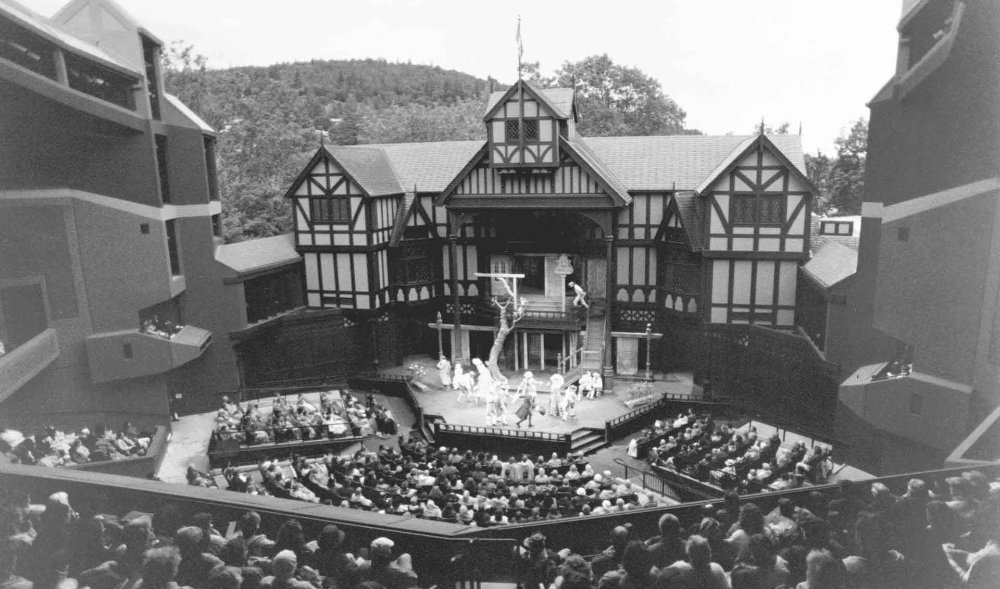The report (reprinted from Ashland News) on rebuilding the Oregon Shakespeare Festival brings welcome news. It’s especially heartening to learn that Tim Bond, who began his career in Seattle and headed the UW’s Professional Actor Training Program, is returning to lead the effort to revitalize the festival following the pandemic plunge in financial support and arts tourism.
Equally exciting is Bond’s move bringing in others with Seattle ties. Among them is Paul Adolphsen as director of literary development, as well as Rosa Joshi from the Seattle University drama faculty and Kaytlin McIntyre from the Seattle Repertory Theatre. A May news story jokingly reported that it’s been “sort of a Seattle takeover.” Bond is working along with the OSF board on its “one brick at a time” rebuilding.
The festival, which will celebrate its 90th year in 2025, has long been the most important dramatic arts showcase in the Northwest. For me, the magic struck years ago when I began traveling to the Southern Oregon Festival, one of a group of eight women theater buffs intent on a Shakespeare fix.
Our annual trips required advanced preparation. We would make four room reservations which we shared with one another. We often booked at the Mark Antony, a splendidly antiquated hotel one block from the festival theaters. Each year that we settled for that hostelry, the place seemed more neglected than the last and more run by neophyte students hired from Southern Oregon University. One year, our request for adjacent rooms (lest we disturb others) netted us rooms 510, 610, 710 and 810.
Also booked well in advance were play tickets. Thanks to two of the eight who had festival memberships, we were usually able to get tickets to seven plays in the four days that we could spend away from jobs and families.
Sometimes things went awry and we would have to settle for seeing six plays, but even with fewer plays we were sure to get our fill of murder, madness, suicide, incest, stabbing, poisoning, and buckets of stage blood.
When not attending festival productions, our gang would explore morning hikes in and around Ashland. Once we got lost and spent two hours in a forced march, barely back in time for an afternoon curtain. In addition to hikes, we also enjoyed attending lectures to learn more about the festival’s history and the challenges of stage craft.
We had occasional picnics in the park, sampled local cuisine, watched the pre-play green shows and scoured local shops to find the most outrageous T-shirt. One year, the prize went to a T-shirt that read, “A good hanging oft saves a bad marriage.”
One obligatory stop in the 1990s was at Lithia Park Shoe Store at First and Main. Not to buy shoes, though none of us was above that (we were all women after all). Instead we were there to check on the Ashland town cat, Odus Magoo, an enormous grey-striped tabby with a Cheshire grin who had wandered into the store and liked what he saw. The Mohabs, owners of the shoe store, took the easy way out and cleared a spot in the front window for Magoo’s basket. He catnapped there beneath his press clippings and posed for snapshots.
Sometimes Magoo strolled across First Avenue to the Mark Antony, headed for the lobby espresso stand and meowed. Where was his bowl of steamed milk? Afterwards he would requisition an antique damask settee in the lobby — the one with the lumpy springs – and take a nap. Paying guests had to find other seating.
Time spent with Magoo was but one page from our Ashland journal. One year the Seattle Eight returned home repeating the line from Henry VI (“the first thing we do is kill all the lawyers”). Another year the best line belonged to a member of the audience, the little old lady who sat to our left during Othello. Asked during intermission what she thought of the tragedy of all-consuming jealousy, the LOL said that friends had persuaded her to see it. She didn’t like it much. She said, “They told me there’d be music.”
But our all-time favorite was a line from The Ladies of the Camellias, funniest romp of the festival’s 1992 season. In one scene, an actor (playing the leading man in a melodrama) faints at the sight of blood. He awakens to find himself surrounded by actors portraying Sarah Bernhardt, Eleanor Duse, Cyrano de Bergerac and a gun-toting anarchist. The befuddled leading man cries out: “What Play Am I In?”
Discover more from Post Alley
Subscribe to get the latest posts sent to your email.

A better headline might be What Cast am I in? I have found there are excellent plays with fine casts, and there are lesser ones with mixed casts. A veteran long ago told me to check the cast lists before ordering tickets. Is that still true?
I started going to OSF with my daughters when they were in high school; they are now 33, and it continues as an annual tradition. We have roped several family members into making the trip with us; we are now up to 11 people.
In my experience, there are no bad actors in the company. Each of us has our favorites, though, and sometimes it’s worth checking the cast list to see what they are in. But it’s also worth seeing the young, up-and-coming actors as well.
Agree with you, Kevin! I missed OSF during the pandemic. The “organizer” for my OSF group just sent suggested play schedule for 2025!